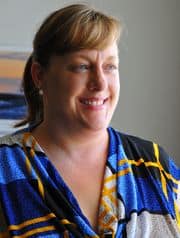
Susan Mackay served in the Navy for 17 years as an administrative assistant to high-level commanders with postings in the United States and Europe.
But since her honorable discharge seven years ago, Mackay’s military experience hasn’t translated into success in the civilian world. She has struggled to find a full-time, steady-paying job.
“Employers don’t seem to get all the things that you had to do,” said the 47-year-old Mackay, a mother of two who lives in the transitional housing facility for homeless veterans in Melbourne. “I remember one time, a lady asked me if I could handle something, and I thought to myself, wow, in the military, you do that or you die.”
“They don’t seem to appreciate the training that we have,” she added.
Susan Mackay, 17 year Navy vet, is looking for a job- ” a career” – and presently living in a Veterans Transitional Facility with her two children.
Mackay’s dilemma highlights a growing problem in Brevard County, and across the United States, of military veterans unable to assimilate into the civilian workforce. While no local figures are readily available, the unemployment rate for military veterans is running anywhere from 3 to 5 percent higher than non-military workers.
Efforts to reverse that trend are occurring special hiring initiatives, military job fairs and retraining programs, for example but it’s an arduous and frustrating process for many who are looking for full time work.
“My thing is that I just need something stable,” said 32-year-old Jonte Hardy of Cocoa, who left the Navy in 2005 and is now participating in electronics training at Veterans Assembled Electronics in Cape Canaveral.
“I’ve been doing construction for six to seven years now but sometimes you just don’t know if you’re going to have steady work,” Hardy said. “For something steady, I haven’t had much luck.”
“I” vs. “We”
The reasons for the veteran employment woes are not entirely clear. Some human resource professionals say there often is a cultural disconnect between military veteran job seekers and civilian employers. Part of the reason seems to be that in the military tasks are centered around a group effort, or teamwork with fellow soldiers, while many higher-paying jobs require individual initiative.
“In the military, soldiers have a team mindset and generally work as a squad. When you bring them back to the civilian world, they’re asked to talk about themselves, and many of them really struggle with that,” said Lida Citroen, the author of “Your Next Mission: A Personal Branding Guide for the Military-to-Civilian Transition.”
“It feels disloyal for them to say this is what I did,” she said.
One national survey of employers conducted by the Center for a New American Security showed that companies have a variety of misgivings about hiring veterans, including fear of lingering disabilities and mental health issues. There also is a concern that if someone is in the military reserves, a company could lose that individual to a future deployment.
Frustration
But probably the most significant concern is about whether veterans have transferable skills and can acclimate to the civilian workplace.
One hiring manager in the Center for New American Security Survey, which was anonymous, bluntly stated: “The work that veterans do is not always translatable into corporate life.”
That’s frustrating local veterans.
“What they’re ignoring with veterans is that we’re highly trainable people,” said Gable Costello, a 36-year-old Navy veteran and an engineering consultant who has been looking for a full-time job in Melbourne for two years. “That’s the biggest skill they fail to translate and appreciate.”
Costello, who said he graduated as the top electrical engineering student at Florida Institute of Technology in 2005, works freelance technology jobs and said his feast-or-famine pay schedule makes it hard to plan the most basic expenses.
“It’s just enough to put food on the table and gas in the tank, but I keep hoping that I’m going to get one of these opportunities to make a career,” he said.
Even highly decorated military veterans can struggle in the job market. One of them is Michael Coulter of Indialantic, a former aviator with the United States Air Force who received numerous awards during his 21-year military tenure, including the “Top in Flight Class” distinction.
In addition to his distinguished military record, Coulter has nine years of business management experience in the civilian world, but a corporate downsizing at his former employer, Intelligent Software Solutions, in May 2013 left him jobless.
“I’ve been doing the networking trick, and I’m getting a master’s degree,” said the 54-year-old Coulter, who continues to fill out resumes and has hired the services of a career coach.
Coulter said that whenever he goes to a job interview, someone thanks him for his service, but that the words have started to feel hollow.
“I want you to hire me not because of what I did, but because of who I am and what I can do for you,” he said.
A way forward
Denise Biondi, spokeswoman for CareerSource Brevard, said that the employment agency is aware of the special challenges that veterans face in the job market. CareerSource is working to combat these problems. Veterans receive first priority on all services offered by CareerSource Brevard.
“Barriers include the preconception that veterans may not be flexible, may not be up to date on the latest technologies, or may be so accustomed to waiting for orders that they are not innovative nor creative problem solvers,” Biondi said. “This is not what we see from Brevard County veterans.”
Biondi said that veterans can overcome these negative perceptions by writing a resume which makes it clear that they have an abundance of useful skills, and that there are a variety of resources including the Military.com skills translator and CareerSource Brevard’s resume advisors that can help.
“I’m very shy so promoting myself does not come naturally. The staff of CareerSource coached me,”said Nancy Mat, a 41-year-old military veteran in Rockledge who served for 11 years in both the Air Force and the National Guard.
“They gave me guidance along the way, and they kept my spirits up,” she said. With the help of CareerSource, Mat, who had lost her job in August 2013, secured a new job as an informational technology specialist for the Navy this February.
Success stories like hers are the inspiration behind several veterans-focused initiatives recently spearheaded by CareerSource.
Last year, the agency started a crowd-sourcing fundraiser called “Operation Work Hero” to solicit donations for unemployed veterans who needed help paying for basic necessities for job searching and job training including items like refurbished computers, an interview outfit, and transportation vouchers.
In October, CareerSource is launching a similar fundraiser called “Jump Start for Military Families,” this time to provide career resources to family members of active-duty military, hoping to focus the bulk of the money on employment resources for military spouses, who are 30 percent more likely to be unemployed than their civilian counterparts nationwide.
There are signs which indicate that the local effort to lower unemployment rates for military families is making an impact, despite the tremendous obstacles. Just ask Justin Anderson, a Navy veteran who once struggled with unemployment himself and who now heads the veterans resource committee of the Melbourne Chamber of Commerce.
“When we first started having career fairs for veterans, the demand was immense, but we had a dramatic drop in the number of people who attended this year. It appears that more veterans are getting hired,” he said.
Contact Kowarski at 321-242-3640 or ikowarski@floridatoday.com. Follow her on Twitter @IlanaKowarski
Need help?
Veteran job resources
For information on vocational programs and other job hunting tools available to Brevard County veterans, call CareerSource Brevard at 321-504-7600 or go to careersourcebrevard.com/job-seekers/military.
Lida Citroen, author of “Your Next Mission: A Personal Branding Guide for the Military-to-Civilian Transition,” said that she will respond to job hunting questions from veterans who email her at lida@lida360.com. She also offers free online tutorials on how to transition between the military and the civilian workforce which you can access at lida360.com/veterans
Want to support veterans?
To donate to Vietnam and all Veterans of Brevard, call 321-690-0805 and ask for the charity’s treasurer Karen Templeton. If you specifically want to support their transitional housing facility for homeless veterans, you should contact the facility’s director, Desmond Cook, by calling 321-409-8167.





